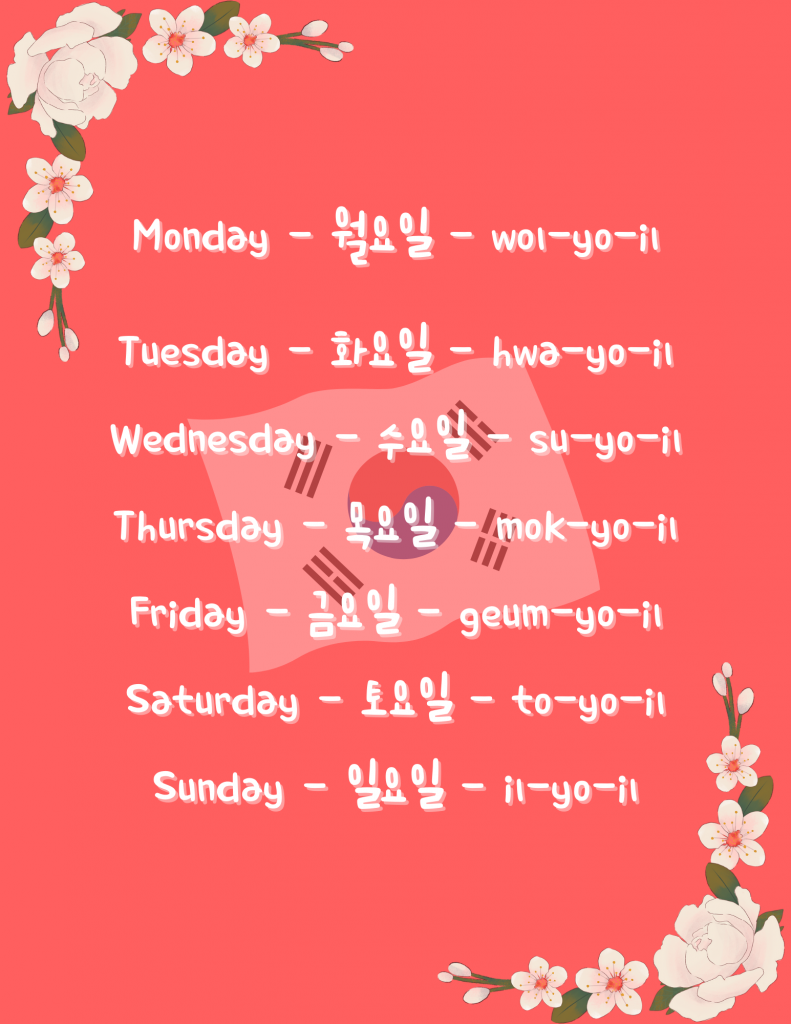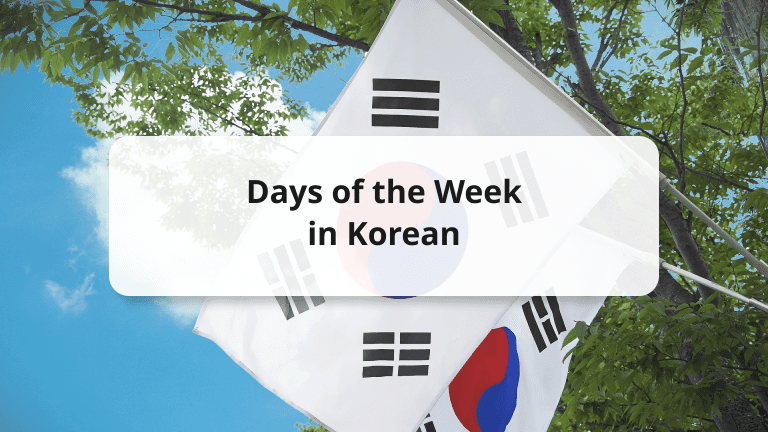Learning a new language can be a challenging, but rewarding experience. In addition to learning how to count in Korean and how to say good morning in Korean, it’s also important to understand how to talk about the days of the week. In Korean, the days in a week are called 요일 (yoil). If you’re a beginner learning Korean, it’s essential to understand how to say and write the days of the week in Korean.
In this guide, we’ll cover the days of the week in the Korean language, including their meanings and pronunciation. We’ll also provide a helpful chart at the end of the article to help you easily reference the Korean names for the days.

Days of the Week in Korean

Sunday: 일요일 (ilyoil)
Sunday is the first day of the week in both Korean and English. In Korean, Sunday is called 일요일 (iryoil), which literally means “day of the sun.” On Sunday, many people in Korea attend church and spend time with their families.
Monday: 월요일 (wolyoil)
Monday is the second day of the week in both Korean and English. In Korean, Monday is called 월요일 (wolyoil), which literally means “moon day.” Many people in Korea start their work week on Monday, so it’s a busy day for many people.
Tuesday: 화요일 (hwayoil)
Tuesday is the third day of the week in both Korean and English. In Korean, Tuesday is called 화요일 (hwayoil), which literally means “fire day.” Tuesday is often considered a “middle” day of the week in Korea, with Wednesday being the halfway point.
Wednesday: 수요일 (suyoil)
Wednesday is the fourth day of the week in both Korean and English. In Korean, Wednesday is called 수요일 (suyoil), which literally means “water day.” Wednesday is often considered the halfway point of the week in Korea, with Thursday being the day before the start of the weekend.
Thursday: 목요일 (mokyoil)
Thursday is the fifth day of the week in both Korean and English. In Korean, Thursday is called 목요일 (mokyoil), which literally means “wood day.” Thursday is the day before the start of the weekend in Korea, and many people start to wind down and prepare for the upcoming days off.
Friday: 금요일 (geumyoil)
Friday is the sixth day of the week in both Korean and English. In Korean, Friday is called 금요일 (geumyoil), which literally means “gold day.” Friday is the last day of the work week for many people in Korea, and it’s a time to celebrate the end of the week and prepare for the weekend.
Saturday: 토요일 (toyoil)
Saturday is the seventh and final day of the week in both Korean and English. In Korean, Saturday is called 토요일 (toyoil), which literally means “earth day.” Saturday is the start of the weekend in Korea, and many people use this day to relax, pursue hobbies, and spend time with friends and family.
| English | Korean | Romanization |
|---|---|---|
| Sunday | 일요일 | iryoil |
| Monday | 월요일 | wolyoil |
| Tuesday | 화요일 | hwayoil |
| Wednesday | 수요일 | suyoil |
| Thursday | 목요일 | mokyoil |
| Friday | 금요일 | geumyoil |
| Saturday | 토요일 | toyoil |
Words Related to Days of the Week in Korean
| English | Korean | Romanization |
|---|---|---|
| weekend | 주말 | jumal |
| weekdays | 주중 | jujung |
| month | 월 | wol |
| day | 일 | il |
| yesterday | 어제 | eoje |
| today | 오늘 | oneul |
| tomorrow | 내일 | nael |
| last month | 지난달 | jinandal |
| this month | 이번달 | ibeondal |
| next month | 다음달 | daeumdal |

Master the Days of the Week in Korean
Congratulations on reaching the end of this guide! With a little practice and effort, you’ll be able to confidently use the days of the week in Korean in your daily conversations and written communication.
If you’re interested in learning the days of the week in other languages, you might also want to consider studying the days of the week in Japanese or brushing up on the days of the week in English. No matter what language you’re learning, it’s essential to practice regularly and try to use new vocabulary in context to help improve your overall fluency.
Don’t forget to continue practicing and challenging yourself as you continue on your language learning journey. With time and effort, you’ll be able to master these words in Korean and make progress in your language journey.
Take the First Step towards Fluency: Sign Up for Korean Lessons with AmazingTalker Today! Also, unlock your language potential with AmazingTalker’s Language Q & A Platform now!

















